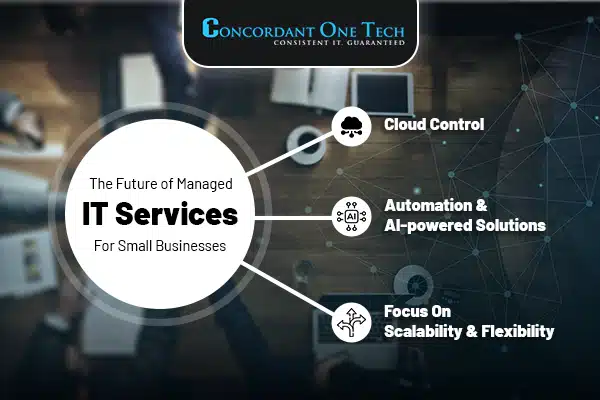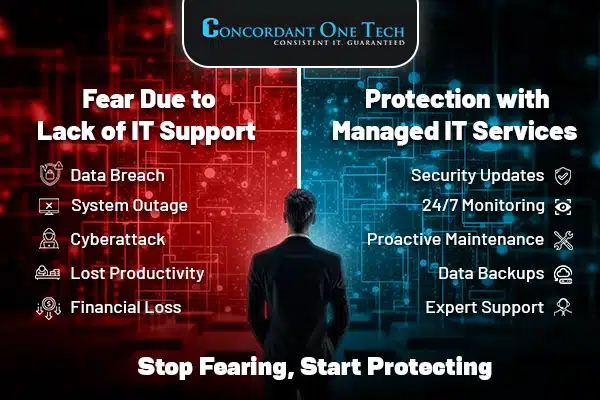The Future of Managed IT Services for Small Businesses: Trends to Watch

24/7 Protection: How After-Hours NOC Monitoring Services Keeps Systems Safe
June 19, 2024
Why Do Businesses Need Remote IT Support?
August 6, 2024The IT infrastructure of any given business is like a ticking time bomb. A single system outage can cause major collateral damage to a business, costing valuable time and revenue.
In accordance with the time factor – it means the productivity of employees being hampered by their systems going out of commission. And your revenue takes a hit as there is no possible input to your business operations, making you miss out on opportunities and incur the associated reparation costs.
MNCs have a dedicated IT team who will do their best to take the best course of action. But that’s not always feasible for small businesses to afford. Fortunately, there’s a solution: managed IT services for small businesses.
Managed IT services providers handle your IT infrastructure, freeing you to focus on the most critical task at hand—running your business. With proactive maintenance, round-the-clock monitoring, and strategic IT management, they ensure your systems are optimized, secure, and in sync with your business objectives. Continue reading this blog to discover the latest trends that make this service even more appealing, helping you protect and enhance your business’s technological foundation.
What are Managed IT Services for Small Businesses?
Managed IT services is the practice of outsourcing the management, monitoring, and maintenance of a company’s IT infrastructure to a third-party service provider. This can include tasks like:
- Managing the company’s IT help desk
- Monitoring network health and security
- Overseeing software installations and updates
- Backing up and securing data
- Migrating, implementing, and upgrading IT systems
Essentially, managed IT services allow businesses to offload the day-to-day responsibility of managing their IT to a specialized provider, freeing them to innovate and grow.
The Future of Managed IT Services for Small Businesses:

Managed IT Services are your essential partners in manoeuvring through and capitalizing on the fast-paced tech world and its latest advancements. Here’s a list of the trends responsible for shaping the future of IT solutions for small business, making it easier for them to make strategic use of modernization:
1. Cloud Control:
The cloud is no longer a “maybe” for businesses, it’s a must-have. But managing all those cloud services can be a headache. Cloud Services for small business help in smoothly connect their cloud infrastructure with the existing computers and software (on-premises systems), optimize performance, and keep everything secure.
2. Automation & AI-powered Solutions:
Time is money, especially when dealing with IT issues. 90% of the Managed Service Provider surveys revealed that automation and cloud computing are fueling their growth by allowing technicians to tackle more critical tasks. Talk about a win-win! Automation handles repetitive tasks, while AI proactively identifies and addresses potential problems.
3. Focus on Scalability & Flexibility:
As businesses become increasingly reliant on managed services, providers of managed IT services for small businesses must adapt to changing needs and support remote or hybrid work models. The MSP industry is projected to surpass $500 billion by 2028, highlighting the need for scalable and flexible MITS offerings.
How can Small Businesses Safeguard their IT Infrastructure?
Avoid unprecedented damages with outsourced IT support at your service.

What Do Managed IT Services for Small Businesses Have to Offer?
This service has multiple natures with various touchpoints to cover as per the corresponding client’s needs. With both reactive (tech support) and proactive (shielding from cyber threats, performance optimization) measures, managed IT services for small businesses provide an all-around protection of your IT infrastructure. These services commonly include:
1. Strategic Planning:

MITS providers help small businesses develop a long-term and efficient IT workflow that aligns or rather protects their technical background needs safeguard their goals achieving trajectory.
A strategic plan minimizes emergencies and guarantees the overall operations are running without any interruption.
In most cases, strategic IT planning includes inviting the concerned provider of IT services for small businesses to board meetings and annual strategic planning sessions.
Being strategic about your IT maintenance creates an open window for reviewing your IT countermeasures and the associated budget annually and making necessary adjustments.
Benefits:
- Cost Efficiency: Prevents costly, unplanned IT emergencies.
- Productivity: Eliminates productivity killers such as slow machines and outdated software.
- Business Growth: There are many small businesses that opt for NOC monitoring services, where a centralized harbours the network systems of computers and internet connectivity. A necessary first line of defense that aligns with business goals, driving growth and innovation.
2. IT Documentation and Inventory:

Comprehensive IT documentation serves as a knowledge base for your organization’s IT infrastructure. It illustrates the interconnection of devices, servers, and network components, depicting data flow paths and illustrating the relationships between devices, connections, software, and storage methods.
Benefits:
- Expedited Problem Resolution:
Industry studies consistently report that a lack of IT documentation is a major contributor to extended network downtime.
When a network outage occurs during peak business hours, the absence of proper documentation can significantly prolong the troubleshooting process. This can lead to substantial revenue loss, decreased productivity, and frustrated employees. A well-documented IT infrastructure, on the other hand, allows for swift problem identification and resolution, minimizing downtime and ensuring business continuity.
- Enhanced Change Management:
IT environments are always welcoming the air of new changes within its technological space. New concepts are introduced, software gets upgraded, and hardware configurations evolve. It enables small business IT support staff to make informed decisions when implementing new technologies or modifying existing configurations.
For instance, during a security protocol upgrade, comprehensive documentation allows IT professionals to quickly identify compatible devices, understand current network security settings, and plan the integration process effectively.
3. Performance and Security Optimization

3.1. Network & Server Monitoring:
Network & Server Monitoring falls under managed IT services for small businesses that involve continuous tracking of the health and performance of your IT infrastructure, including servers, network devices, and applications. This monitoring is typically performed 24/7 by specialized software and tools.
Procedures Involved:
- The system continuously gathers data on key metrics (uptime, resource utilization, etc.).
- Alerts are triggered for anomalies or performance issues.
- The MITS team investigates alerts, identifies root causes, and takes corrective action.
Benefits:
- Proactive monitoring catches issues early, minimizing downtime and business disruption.
- Network monitoring identifies and addresses performance bottlenecks, optimizing IT efficiency.
- Monitoring alerts enables swift diagnosis and resolution by the MITS team, minimizing business impact.
Such services commonly involved both – After Hours NOC support and Remote IT Help Desk Support.
3.2. Cybersecurity Solutions:
Cybersecurity Solutions offered by MITS providers involve a comprehensive set of strategies and technologies designed to safeguard your IT infrastructure from cyberattacks, data breaches, and other malicious activities.
Procedures Involved:
- MITS providers use scanning tools to find system and application weaknesses, applying patches to reduce risks.
- These systems monitor network traffic for suspicious activity, with IDS logging events and IPS blocking malicious traffic.
- Aggregating security tool data, providing a centralized view to detect and respond to threats promptly.
Benefits:
- Enhanced Security Posture: IT support companies for small businesses are experts at fortifying your computing defenses with counteractive security measures, significantly reducing cyberattack and data breach risks.
- Improved Compliance: They ensure regulatory adherence through business operation-specific security controls, meeting industry standards along the way.
- Peace of Mind: Proactively secured IT infrastructure allows undistracted focus on core business activities.
- Reduced Financial Risk: IT disaster recovery solutions negate potential financial losses stemming from cyberattacks.
4. Technical Support & User Training

MITS providers offer a combined support system of technical support and user training. Technical support helps minimize downtime and disruptions by offering swift resolution to IT issues. A dedicated team of remote IT support for small businesses is always on standby to diagnose and troubleshoot problems.
Consequently, user training programs allow employees to confidently use software applications, maximizing their effectiveness and reducing the number of support tickets. This allows complex challenges to be prioritized.
5. Data Backup & Disaster Recovery:

Data Backup and Disaster Recovery (DR) solutions are essential for safeguarding business continuity during unforeseen circumstances. Integrating data duplication, information vaults, and offsite DR systems into your business continuity plan provides a vital shield against potential disruptions.
Data backup and recovery involve creating regular copies of your critical data and storing them securely in information vaults. This ensures that, in the event of a disaster, the data can be restored to its original location or a safe alternative, minimizing downtime and allowing your business operations to continue uninterrupted.
Process Involved –
A full proof Data Recovery planner must involve the following steps:
- Vulnerability Assessment: Identify weaknesses in existing data protection measures.
- Infrastructure Optimization: Fortify IT systems with redundancy, cloud-based recovery, and fast network connections.
- Regular Testing: Validate backup integrity and DR plan effectiveness through simulations.
- Documented Procedures: Create clear instructions for data restoration, system recovery, and business resumption.
- Hardware and Power Redundancy: Provide backup hardware and UPS systems to safeguard critical equipment.
Benefits:
- Reduced Downtime and Revenue Loss: Rapid data recovery minimizes business disruptions, preventing lost sales and productivity.
- Customer Satisfaction: Minimized downtime ensures consistent service delivery and contributes towards building customer trust and loyalty.
- Stronger Regulatory Compliance: Robust DR solutions facilitate adherence to industry-specific data protection regulations, avoiding costly fines and reputational damage.
Managed IT Services for Small Businesses in Various Industries – Demand Map
| Solution Name | The Concerned Industries | Need in the Industry | Industry Adoption Rate (Estimate) |
| AI-Powered Network Optimization | Tech hubs (Silicon Valley, Tel Aviv) | Reduced network latency, improved application performance, and cost savings | 15-20% |
| AIOps | Data science and IT operations | Improved IT operations, proactive issue resolution, and automated incident response | 10-15% |
| Edge Computing | Telecommunications and IoT industries | Low latency applications, data privacy, and improved user experience | 20-25% |
| Cybersecurity Mesh | Cybersecurity research labs and startups | Threat protection, adaptive security, and micro-segmentation | 5-10% |
Power your Small Business with Managed IT Services
The future of small business-managed IT services will introduce a variety of solutions to tackle diverse touchpoints and potential IT-related issues. However, with a strategic approach and “better safe than sorry” countermeasures for your IT infrastructure, every potential threat can be negated. This includes issues such as compromised productivity, financial loss, or data breaches, which can erode customer trust.
Small businesses can now cost-effectively safeguard their IT infrastructure through Managed IT Services (MITS) without the overhead of an in-house IT team. Concordant One Tech has got your back when it comes to IT solutions. As a trusted provider of outsourced IT services for small businesses, we’ve helped businesses across different industries secure their digital assets, and we’re ready to do the same for you. Reach out today and see how we can protect your business’s digital integrity.
Frequently Asked Questions
1. What happens to my data when I use managed IT services for small businesses?
A: Reputable MSPs take data security very seriously. They will have clear data privacy policies outlining how your data is handled and stored. It’s crucial to choose an MSP that prioritizes data security and adheres to industry compliance regulations.
2. How can managed IT services for small businesses help keep my business data secure?
A: Security is a top priority for MSPs. They offer various services to protect your data, including:
- Regular security assessments and updates
- Data backup and disaster recovery
- Employee security awareness training
3. My business is very specific, will managed IT services still work for me?
A: Many MSPs cater to various industries and can adjust their services to meet the unique needs of your business. You can discuss your specific requirements with potential providers of managed IT services for small businesses to ensure a good fit.
4. I’m worried about losing control of my IT with managed services. Will I still have a say?
A: Reputable MSPs operate on a transparent model. You’ll have a dedicated account manager who understands your business needs. They’ll keep you informed, discuss proposed solutions, and ensure your IT aligns with your overall business goals.



